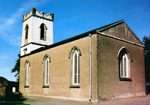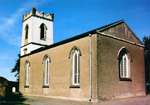Sermon for Sunday, 2nd September 2012 (Trinity 13/Pentecost 14/Proper 17/Ordinary 22)
“You have let go of the commands of God and are holding on to the traditions of men.” Mark 7:8
Have you ever been sat in a church service and wondered that you might be out doing something more useful instead? It’s not that you don’t believe, not that you don’t feel that God is present in your life, but that you wonder if the church has anything to do with your faith. There are occasions when such thoughts have crossed my mind, perhaps it was a failing on my part, but there have been moments at church services where I did not get a great sense that I was meeting with the living Jesus.
The Jesus we meet in the Gospels is always exciting; always relevant to the problems and needs of people; always challenging to those who need change; always open to those who seek help; always a friend to the stranger; always a support to the tired and depressed; always an inspiration to anyone who tried to follow him. The Jesus we meet in the Gospels is the most amazing, most charismatic, most life-changing man. Shouldn’t coming to church be about meeting with him?
I remember someone talking about growing up and having to endure what he called “the mind-numbing boredom of the Church of Ireland”. No-one is likely to tell the clergyman, but there are moment when I wonder if that feeling is widely felt.
When we hear Jesus’ scathing attack on the Pharisees in today’s reading from Saint Mark, we think it’s got nothing to do with us. The Pharisees were a religious group 2,000 years ago, but they had become stuck in their ways. Their beliefs were sincere and they were good people, but the life and the power had gone out of their religion. Jesus says to them, “You have let go of the commands of God and are holding on to the traditions of men.”
The Pharisees would have been furious at Jesus. They would have dismissed him as a troublemaker and a rabble rouser. They would have been angry with him because he had hit a sore spot. Many devout Jews knew that their religion had become lifeless. The very reason why groups like the Pharisees had sprung up was to try to counteract what they saw as the rottenness and deadness at the heart of religion.
Jesus doesn’t tell them that what they believe is wrong. He tells them that how they go about practising their beliefs is the problem They have forgotten the commands of God and they have become concerned only with their own traditions.
There are many people, particularly younger people, who have no problem with Christianity, their problem is with the way the church goes about things. They are happy with the commands of God, what they are not happy with are the traditions of the church.
Jesus’ command to us is clear, to make disciples of all people, but we will not be able to do that if our traditions become an end in themselves. Traditions are only useful if they serve the original purpose, which is to tell people about Jesus. Jesus is not concerned with the outward rituals, he is concerned with what is in our hearts and the hearts of those we meet.
It is not what we do, it is the way that we do it. It’s not the outward traditions that count, it’s the faith we have in our hearts. There can be 16th Century liturgies that are full of warmth and life, and modern worship events that are cold and impersonal; what is important is that we meet with God and not just with tradition. What is important is our meeting with this amazing, charismatic, life-changing man, and our response to him.
Jesus criticized the worship of the Pharisees in words from Isaiah, ‘These people honour me with their lips, but their hearts are far from me’. I’m sure that criticism applies to all of us at times, it certainly does to me, what matters is how we respond. What matters is us asking ourselves, ‘how can I help make my church a place where anyone who walks in feel that they can meet with God?’
“You have let go of the commands of God and are holding on to the traditions of men,” Jesus accuses the Pharisees. Let’s not be guilty of the same accusation.



Comments
Sermon for Sunday, 2nd September 2012 (Trinity 13/Pentecost 14/Proper 17/Ordinary 22) — No Comments
HTML tags allowed in your comment: <a href="" title=""> <abbr title=""> <acronym title=""> <b> <blockquote cite=""> <cite> <code> <del datetime=""> <em> <i> <q cite=""> <s> <strike> <strong>